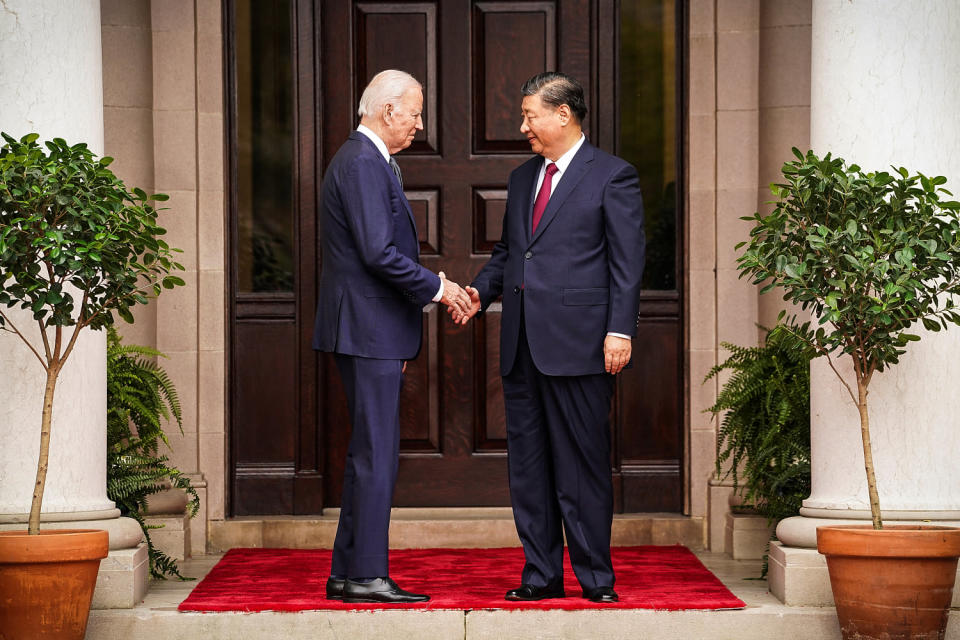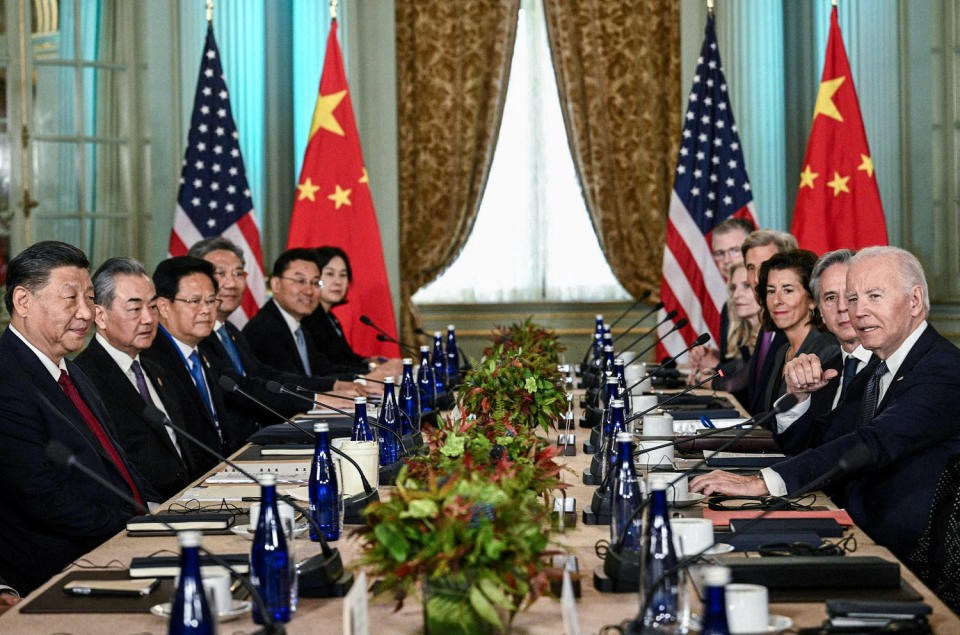Biden says 'real progress' was made after meeting with China's Xi Jinping
- Oops!Something went wrong.Please try again later.
- Oops!Something went wrong.Please try again later.
- Oops!Something went wrong.Please try again later.
SAN FRANCISCO — President Joe Biden met face to face with his Chinese counterpart, Xi Jinping, on Wednesday and said afterward they had agreed to revive dormant military communication channels, crack down on fentanyl trafficking and work jointly to address rapid advances in artificial intelligence.
The four-hour summit broke a yearlong silence marked by rising tensions that have stoked fears that the two countries are on a path toward direct conflict.
At a news conference afterward, Biden said, "I believe they were some of the most productive and constructive discussions we've had."
Having gone a full year without speaking, much less meeting in person, the two leaders agreed that they could now pick up the phone and call each other directly when needed, Biden said.
The summit took place at the 654-acre Filoli estate in Woodside, about 35 miles south of San Francisco, where the two leaders are also taking part in a separate summit meeting of Asian-Pacific nations.
After a formal session with top advisers, Xi and Biden met again for a working lunch and later walked the grounds together in front of the cameras. They passed reporters at one point, and in response to a shouted question about how the talks were going, Biden said, "Well," and gave a thumbs-up.
There were no breakthroughs, however, on some long-standing issues — chiefly, the status of Taiwan — that have soured relations between the world's two largest economic powers. Nor was there any sign that Biden was reassessing his belief that China is a formidable and potentially dangerous competitor.
He cautioned that he won't accept Chinese promises to cooperate at face value. When a reporter asked whether he trusted Xi, Biden repeated a phrase former President Ronald Reagan used when he negotiated arms control accords with the old Soviet Union in the 1980s: "Trust but verify."
Asked at the news conference whether he saw Xi as a dictator — the word he used to describe Xi over the summer — Biden said he did.
“He’s a dictator in the sense that he is a guy who runs a country that is a communist country that’s based on a form of government totally different than ours,” he said.
Responding Thursday, the Chinese Foreign Affairs Ministry criticized Biden’s remark as “extremely wrong and irresponsible political manipulation.”
"The term came out naturally but also quite undiplomatically given that they just had the summit meeting and the Chinese are particularly sensitive about this," Yun Sun, the director of the China Program at the Stimson Center, said in an email. "I think Biden might feel more at ease using the term now the meeting is over."
She added that China will not abandon the agreement at this point but that Biden's remark doesn’t cast a very promising light" on the future of bilateral relations.
Biden said earlier: "We're in a competitive relationship, China and the United States, but my responsibility is to make this rational and manageable, so it doesn't result in conflict. That's what I'm all about. That's what this is about."
Still, Biden hailed the three areas in which the sides reached consensus.
The U.S. discussed with China a plan to cut down the flow of fentanyl precursors that are contributing to an illegal drug scourge in the U.S., according to a senior administration official who briefed the media pool.
“The president basically said, look, this one of the worst drug problems the United States has ever faced. Tens of thousands of American perishing annually," the official said.
After close calls between Chinese and American warships and planes, U.S. officials are delighted that China will reopen military communication lines.
In announcing the resumption of military-to-military talks, which aim to prevent inadvertent conflict, Biden said “vital miscalculations” can cause “real trouble.”
Defense Secretary Lloyd Austin will meet with China’s defense minister, once the person is named, the U.S. official said. China’s previous defense minister, Li Shangfu, departed the administration weeks ago. Li had been sanctioned by the U.S.
The official also said the countries are establishing “operational engagements,” allowing senior military commanders to engage with counterparts.
Taiwan remains a knotty problem for both sides. Xi wants to unify China and Taiwan, the self-ruling democracy that China claims as its own. While Biden's "one China" policy does not favor Taiwan independence, he has objected to what he sees as aggressive military actions that have menaced Taiwan.
Biden asked that China respect Taiwan's electoral process ahead of the island's presidential election in January. In response, Xi argued that peace is "all well and good" but that eventually they needed to move toward resolution, the U.S. official said.
Hua Chunying, a Chinese official who attended the larger bilateral meeting, said on X that Xi said the "Taiwan question remains the most important and most sensitive issue in China-U.S. relations."
She added that the U.S. should "support China's peaceful reunification."
"China will realize reunification, and this is unstoppable," she said in the post.
Biden and Xi greeted each other at 11:15 a.m. local time. As Xi left his limousine, he walked toward the historic country house along a red carpet and was greeted by Biden, who had arrived earlier and was awaiting him in the doorway. The two briefly shook hands and waved to the media corps before they entered the building.
Inside, they faced each other across a long rectangular table, with Chinese and American flags at the far end. They were flanked by their respective delegations. Biden sat between Secretary of State Antony Blinken and Treasury Secretary Janet Yellen.
In his opening remarks, Biden said previous meetings between the two leaders have "always been candid, straightforward and useful." He said competition between China and the U.S. must not veer into conflict, a point he has been stressing for months.

"I value our conversation, because I think it’s paramount that you and I understand each other clearly, leader to leader, with no misconceptions or miscommunication,” Biden said.
Xi spoke next. Through an interpreter, he said the two countries have the most important bilateral relationship in the world.
"For two large countries like China and the United States, turning their back on each other is not an option," Xi said. "It is unrealistic for one side to remodel the other, and conflicts and confrontation has unbearable consequences for both sides."
The summit featured a few lighter moments. Biden will turn 81 on Monday. Xi’s wife shares the same birthdate. When Biden said he wished her a happy birthday, Xi said he had been working so hard that he’d forgotten. He thanked Biden for the reminder, the official said. After the news conference, Biden was scheduled to attend an evening reception in San Francisco for Asia-Pacific Economic Cooperation leaders, which Vice President Kamala Harris and first lady Jill Biden will also attend.
The summit is the first time the two presidents have met since a three-hour session on the sidelines of a summit in Bali, Indonesia, a year ago. The visit is also the first time Xi has stepped foot in the U.S. since 2017.
In the hours before the meeting, John Kirby, a spokesman for the White House's National Security Council, told reporters: “I think we’re all expecting that this will be a productive discussion today. And hopefully, a precursor to much more communication and dialogue between our two teams going forward.”
Over the past year, relations between the U.S. and China have deteriorated in ways that elevate the risk of an unwanted confrontation, U.S. officials said. As an example, when the Biden administration shot down a Chinese spy balloon that flew across the U.S. in February, the Defense Department had no one in China to contact because Beijing had closed an important military communications channel, a senior Biden administration official told reporters Tuesday while previewing the Biden-Xi meeting.
“It is true that when the Chinese spy balloon went across the United States, we had no way to communicate with the Chinese,” the official said. “That’s not responsible, and we hope to at least take some preliminary steps" toward improving communications.

U.S. officials believe Biden entered the meeting from a position of strength. While the Chinese economy is struggling with high youth unemployment and disinvestment from foreign companies, Biden has boasted of robust economic growth in the U.S., accompanied by a low jobless rate.
After he arrived in San Francisco on Tuesday, Biden attended an evening fundraising event at which he said: “President Xi is another example of how re-establishing American leadership in the world is taking hold. They’ve got real problems, folks.”
Preparation for the summit was months in the making. In the run-up, Blinken had given priority to resuming military-to-military talks with China, as well as curbing the flow of narcotics into the U.S., according to a U.S. official involved with China policy. Blinken raised the issues directly with Chinese officials four times since his visit to China in June, including with top Xi administration officials like Vice President Han Zheng and Foreign Affairs Minister Wang Yi.
When Wang visited the U.S., Blinken described a Chinese fighter jet’s close call with a U.S. warplane flying in international airspace over the South China Sea. He noted that the leaders were sitting at a table about 10 feet long — the distance between the two aircraft during the near-collision, the source said. Blinken used the anecdote to illustrate the risk of an accidental collision and show why the two countries need to revive military communication channels.
This article was originally published on NBCNews.com

